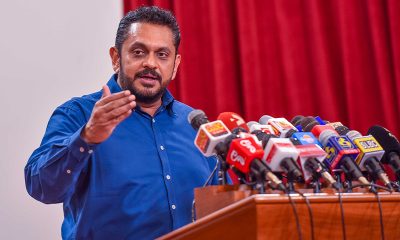News
Uma Oya Project: Call for compensation continues

By Rathindra Kuruwita
The problems facing 17,000 families, affected by the negative environmental impacts of the Uma Oya project, have not yet been solved, Sajeewa Chamikara of the Movement for Land and Agricultural Reform (MONLAR) told The Island.
In December 2014, a leak sprang up in its 15.2 km tunnel and due to that thousands of houses were damaged, and there was a loss of drinking and irrigation water which devastated the lives and livelihoods of thousands, he said.
Ella, Bandarawela, Hali-Ela, Haputale, Welimada, and Uva-Paranagama divisional secretariat areas were the most affected.
“These families have not yet been fully compensated, or their grievances addressed. Initially, some families were provided 500 litres of drinking water, once in two weeks. This was also stopped after a while. Now people travel long distances to find water,” Chamikara said.
On the other hand, the majority of those who lost their livelihood and saw their houses damaged have not been fully compensated. “Given that their agricultural land is dried up, people work as labourers in other areas. It is unlikely that the impacts of the leak could be fully mitigated even if the government spends colossal amounts of money,” he said.
Chamikara said the environmental and social impact of the project could have been avoided if the Mahinda Rajapaksa government carried out a comprehensive Environmental Impact Assessment (EIA).
“The EIA for Uma Oya is one of the worst in the history of the country. However, even that EIA states that the project is being implemented in a problematic geographical and geological location and further geological investigations are needed to determine whether the bedrock conditions are suitable for the construction of tunnels.
However, the government went ahead with the project and tunnelling took place in areas with metamorphic rocks which are more resistant to deformation and weathering than sedimentary rocks. Thus, the tunnelling destabilized the ground leading to cracks appearing on the surface, which in turn has caused cracks to appear on the buildings in these areas. Moreover, as ground water seeps deeper due to the destabilization, the surface water also lowers, depriving water for agriculture and general consumption.,” he claimed.
The feasibility of such a project, based on Uma Oya, was first considered in 1987. The German consulting firm LAHAMAYOR carried out the feasibility study. Once again in 1991 the Central Engineering Consultancy Bureau did a feasibility study and presented it to the Asian Development Bank (ADB) which rejected the proposal citing that it has failed to adhere to accepted international norms.
Between 2002 and 2003 a Canadian Consulting Firm SNC – LAVALIN also carried out a feasibility study to determine the possibility of a multipurpose development project, based on Uma Oya.
In all these studies attention was said on the feasibility of constructing two tanks in Puhulpola and Dayaraba. When this proposal was presented to the ADB in 1991, it rejected the proposal stating that there are numerous technical issues with the proposal and such as in transferring water between water basins.
“Iran on the other hand believed that, if money and technical assistance is provided, the Sri Lankan government would do what is best for Sri Lankans. But as we know, successive Sri Lankan governments have cared little for the wellbeing of the people,” Chamikara said.
News
US sports envoys to Lanka to champion youth development

The U.S. Embassy in Colombo welcomed the U.S. Sports Envoys to Sri Lanka, former National Basketball Association (NBA) and Women’s National Basketball Association (WNBA) players Stephen Howard and Astou Ndiaye, from June 8 through 14.
The Public Diplomacy section of the U.S. Embassy said that it would launch a weeklong basketball program intended to harness the unifying power of sports, made possible through collaboration with Foundation of Goodness and IImpact Hoop Lab.
While in Sri Lanka, Howard and Ndiaye, both retired professional basketball players, will conduct a weeklong program, Hoops for Hope: Bridging Borders through Basketball. The Sports Envoys will lead basketball clinics and exhibition matches and engage in leadership sessions in Colombo and Southern Province for youth aged 14-18 from Northern, Uva, Eastern and Western Provinces, offering skills and leadership training both on and off the court. The U.S. Envoys will also share their expertise with the Sri Lanka Basketball Federation, national coaches, and players, furthering the development of basketball in the country. Beyond the clinics, they will collaborate with Sri Lankan schoolchildren to take part in a community service project in the Colombo area.
“We are so proud to welcome Stephen and Astou as our Sports Envoys to Sri Lanka, to build on the strong people-to-people connections between the United States and Sri Lanka,” said U.S. Ambassador Julie Chung. “The lessons that will be shared by our Sports Envoys – communication, teamwork, resilience, inclusion, and conflict resolution – are essential for leadership development, community building, equality, and peace. The U.S. Sports Envoy program is a testament to our belief that sports can be a powerful tool in promoting peace and unity.”
News
Rahuman questions sudden cancellation of leave of CEB employees

SJB Colombo District MP Mujibur Rahuman in parliament demanded to know from the government the reasons for CEB suspending the leave of all its employees until further notice from Thursday.
MP Rahuman said that the CEB has got an acting General Manager anew and the latter yesterday morning issued a circular suspending leave of all CEB employees with immediate effect until further notice.
“We demand that Minister Kanchana Wijesekera should explain this to the House. This circular was issued while this debate on the new Electricity Amendment Bill was pending. There are many who oppose this Bill. The Minister must tell parliament the reason for the urge to cancel the leave of CEB employees,” the MP said.However, Speaker Mahinda Yapa Abeywardena prevented Minister Wijesekera responding to the query and said that the matter raised by MP Rahuman was not relevant.
News
CIPM successfully concludes 8th Annual Symposium

The Chartered Institute of Personnel Management (CIPM) successfully concluded the 8th Annual CIPM Symposium, which took place on 31st May 2024. Themed “Nurturing the Human Element—Redefining HRM in a Rapidly Changing World,” the symposium underscored the pivotal role of human resource management (HRM) in today’s dynamic global landscape. Since its inception in 1959, CIPM has been dedicated to advancing the HR profession through education, professional development, and advocacy, solidifying its position as Sri Lanka’s leading professional body for HRM.
Ken Vijayakumar, the President of the CIPM, graced the occasion as the chief guest. The symposium commenced with the welcome address by the Chairperson, Prof. Arosha Adikaram, followed by the Web Launch of the Symposium Proceedings and Abstract Book by the CIPM President. The event featured distinguished addresses, including a speech by Chief Guest Ken Vijayakumar, President of CIPM, and an address by Guest of Honor Shakthi Ranatunga, Chief Operating Officer of MAS Holdings Pvt. Ltd., Sri Lanka.
The symposium also featured an inspiring keynote address by Prof. Mario Fernando, Professor of Management and Director of the Centre for Cross Cultural Management (CCCM) at the University of Wollongong, Australia.
Vote of Thanks of the inauguration session was delivered by Dr. Dillanjani Weeratunga, Symposium Co-chair.
The symposium served as a comprehensive platform for researchers to present their findings across a wide range of critical topics in HRM. These included Cultural Diversity and Inclusion, Talent Development and Retention, Ethical Leadership and Corporate Social Responsibility, Adapting to Technological Advancements, Mental Health and Well-being at Work, Global Workforce Challenges, Employee Empowerment, and Reskilling and Upskilling.
The plenary session was led by Prof. Wasantha Rajapakse. Certificates were awarded to the best paper presenters during the valedictory session, followed by a vote of thanks delivered by Kamani Perera, Manager of Research and Development.
The annual symposium of CIPM was a truly inclusive event, attracting a diverse audience that spanned undergraduates, graduates, working professionals, research scholars and lecturers. This widespread interest highlights the symposium’s significance in the field of HRM, offering a unique opportunity for everyone to network and learn from scholarly brains.The CIPM International Research Symposium was sponsored by Hambantota International Port, Sri Lanka Institute of Information Technology (SLIIT), E B Creasy & Co. PLC, and Print Xcel Company.














